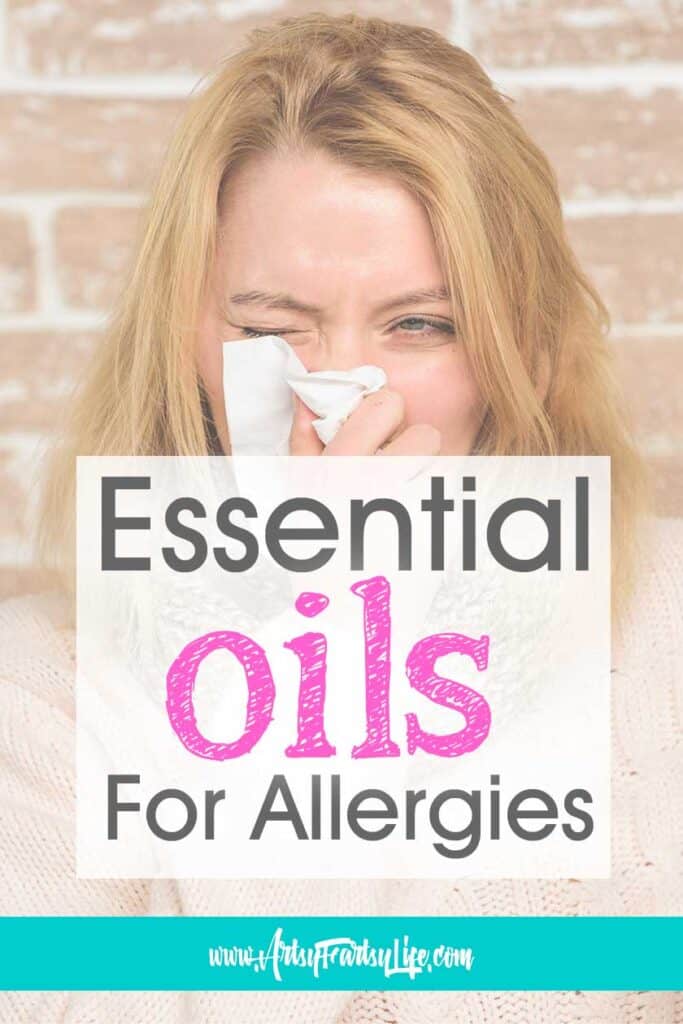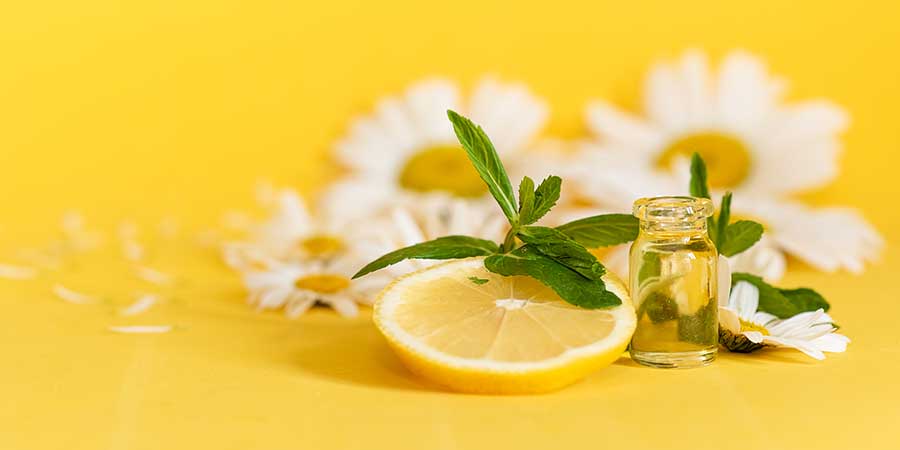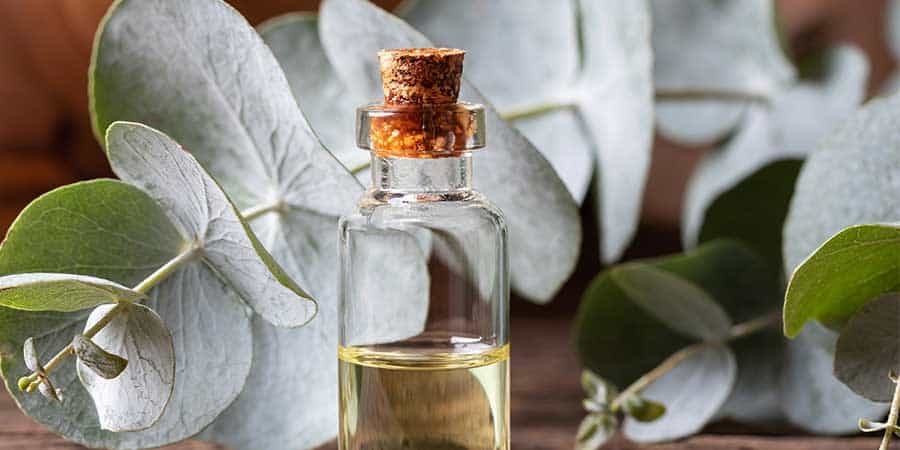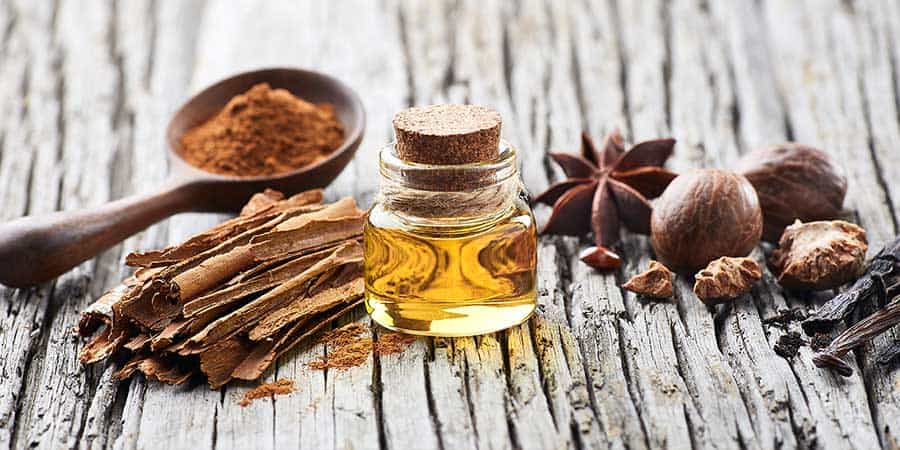I am allergic to everything, seriously, dogs, cats, grass, dust, food, mold… everything!
And I hate to take to pills… sigh. I do it when I HAVE to, when the sneezing sore throat and watery eyes get too bad, but antihistamines make me fall asleep so I am not sneezy, but I am not awake either!
What I have found that helps for day-to-day allergy fighting is essential oils!
Here are my best tips, tricks and recipes for how to fight allergy symptoms with essential oils!

Essential Oils For Allergies
Peppermint

Peppermint oil is fantastic for clearing out congested sinuses. It also helps with inflammation. If your congestion heads south to your lungs, it’s also an expectorant.
The European Journal of Medical Research reported that menthol oil (which is part of peppermint essential oil) has anti-inflammatory properties and also an anti-spasmodic effect on the windpipe muscles.
Basically what it means that by inhaling it will soothe your cough and clear your sinuses, plus that headache you have from the congestion will also go away.
Lavender
Lavender oil is a natural antihistamine and anti-inflammatory. Stuffy heads beware! Sometimes your stuffy head isn’t mucous, but instead is inflammation closing down the airways in your nose.
Trouble sleeping because of sneezing, coughing or stuffed up nose, lavender is well-known as a natural way to help with that as well as headaches, rashes and hives.
Additional Resource :: 3 Fun Essential Oils Pillow Spray Recipes To Help You Sleep Like A Baby
The Journal of Life Sciences reported that the medicinal compounds in lavender oil help to inhibit the production of histamine and suppress inflammatory responses in the airways.
Diffuse at night, put a drop or two on your pillow (or make a pillow spray) or inhale just before bed. You’ll sleep and breathe better.
Chamomile
Like lavender, chamomile essential oil is well known to sooth and relax. It also sooths rashes or hives, it will soothe the itchiness and keep your nerves from fraying.
If you suffer more from sneezing, stuffiness or excess mucous, chamomile will also provide a calming effect on your respiratory system. Diffuse when needed or mix with a carrier oil and apply to the hives or rash.
Tea tree oil
Tea tree essential oil is a powerhouse of an essential oil. For allergies, it helps to reduce inflammation and prevent infections.
The antibacterial and antimicrobial properties help to kill mold, fungi and bacteria in the air which will help reduce allergic reactions.
It’s also a great decongestant for relief of bronchial congestion, coughs, and excess mucus. How often does your hay fever turn into a sinus infection? Tea tree can prevent that.
Lemon

Lemon essential oil is a great cleaning oil, but it also is good for treating respiratory problems associated with allergic reactions.
It’s a natural antioxidant agent that will help remove toxins and reduce your response to allergens. Cleaning with it will disinfect surfaces and remove pathogens.
The Journal International Scholarly Research Notices reported that using a lemon oils based nasal spray helped to reduce nasal mucus and helped treat sinus, throat and mouth inflammation. It will also give you a much needed mood boost. Diffuse, roll on or use it in cleaning.
Additional Resource :: Essential Oils Kitchen Cleaning Spray Bottle… Tips and Recipes
Lemongrass
Lemongrass essential oil is good for reducing allergy symptoms like sneezing, wheezing, and a stuffy or a runny nose. It smells a lot like lemons.
Inhaling a lemongrass can help to reduce inflammatory complications in the respiratory tract. Like tea tree it’s also antifungal and helps to kill off pathogens that can aggravate allergic reactions.
Bergamot oil
Bergamot essential oil is a citrus oil like lemon. It has anti-inflammatory and antibacterial properties for treating allergies.
One study from 2010 found that bergamot was effective in relieving cough, asthmatic symptoms, and reducing phlegm in cases of bronchial asthma. It has the added benefit of improving your mood and makes you feel more mentally alert.
Eucalyptus oil

Eucalyptus essential oil, like peppermint is a natural expectorant and can help treat many respiratory conditions. It will relieve nasal congestion, clearing your airways, and helping you breathe easier.
It will also have a cooling effect on nerves in your body. Use steam inhalation with eucalyptus essential oil to get help reduce swelling of the respiratory tract mucous membranes, treat coughs, ease sinus pain, and clear respiratory infections, and used topically (diluted with a carrier oil) helps with stuffiness.
Sandalwood
Sandalwood helps to reduce the effect of allergens by reducing the reaction of the antibodies in your system. Properties of the oil help to inhibit allergic responses that cause a runny nose, stuffiness, and mucus.
Sandalwood oil is also a great natural way to treat the symptoms of anxiety, stress, and depression.
Thyme
Thyme oil helps to inhibit inflammatory responses in the body and kill off any fungal or bacterial infections. It also has antispasmodic, antimicrobial, antifungal, and antiviral properties that help with respiratory symptoms.
Oregano
Oregano essential oil does a number of things for you. It can help to boost your immune system which will make allergic reactions less frequent. It also has strong antibacterial and antimicrobial activities than can help to keep your respiratory tract clear.
Frankincense
Frankincense essential oil is a known anti-inflammatory oil, that will also boost your immune system. Frankincense contains a compound called alpha-pinene which reduces allergic symptoms. It also has the benefits of being an expectorant, decongestant, anti-inflammatory and can help to unblock sinuses and clear bronchial congestion.
Clove

Clove essential oil works for allergies by being an anti-fungal and antimicrobial. It is also anti-inflammatory but isn’t as good in that area as other oils.
Rosemary
Rosemary essential oil has an antihistamine-like effect. Studies at the University of Maryland report that rosemary oil is used widely to relieve muscle pain and stimulate hair growth, and that it has medicinal properties that come from antioxidants and antimicrobials in the oil.
Basil
Basil essential oil can help to reduce inflammation and fight infections. It also calms and helps you sleep better. Traditionally, it’s been used to alleviate coughs, headaches, and gastrointestinal upset. It contains eugenol compounds that are rather effective at treating bacterial and fungal infections. It has been shown to also have antihistamine properties.
How To Use These Essential Oils
There are many different ways to use essential oils! Here are a few that I use…
- You can add a few drops of it to your diffuser to inhale (be careful if you have cats!)
- Use a roller ball to rub it onto your feet or hands (make sure to mix with some kind of carrier oil if you are sensitive!)
- Use an inhaler with drops of oil on the inside
- Add to a super hot bath (it acts as a huge steam diffuser!)
What I don't suggest is ingesting them (swallowing them). There have been some pretty recent articles about the dangers of ingesting essential oils… Essential oils are potent, risky and promising. Here’s what you need to know. source Washington Post
Essential Oils For Allergies Recipes
You can blend essential oils into “recipes” that work for you! Here are a few that I use, mix and match your own depending on your symptoms or triggers!
Peppermint, Lavender and Lemon
These are my “Big 3” essential oils that I use in almost every roller ball I ever make! Put between 10-20 drops each in your roller ball (or diffuser) and add a carrier oil if you are sensitive. This helps my stuffy nose and helps calm me down when I am just normally stuffy!
Eucalyptus, Clove and Rosemary
Okay, now we are calling in the big dogs of oils! I only use these when I am seriously feeling sick because they are STRONG and can irritate your skin or cause harm to your cats if you use them in small spaces.
Using these together in a diffuser or hot bath is like getting a hit of Mentholatum right to your senses.
I use MUCH less of these (like 5-10) drops and dilute them a lot when I use a roller ball.
Mix and Match

If you are just getting started with essential oils the “airy fairy”, “use what works for you” method of picking oils might be frustrating. But hear me out!
Because some oils work on some people and not others, it is worth taking the time to try and see which will be the best for you!
It is also about what you can stand to smell… I HATE the smell of tea tree oil so even if it was the best at helping with sniffies, having it on or around me all the time is a non-starter!
I would start with the Big 3 (peppermint, lavender and lemon) and then add others in and see what helps.
Chronic Allergies, Sinusitis or Rhinitis
If you get occasional bouts of sneezing or hay fever a couple of times a year during allergy season, it might not be worth all the effort to test and try the different essential oils. Pop a couple of antihistamines and call it a day.
But I have chronic allergies and the sinusitis and allergic rhinitis (blocked nasal passages) that goes along with them. I am more stuffy, can't smell and get headaches rather than constant drippy nose, but those happen from time to time too!
For me the benefit of being able to use something that is more natural most of the time is a huge deal. I have been able to avoid taking daily allergy pills by using essential oils during all but the worst times!
Hopefully this post will help with your allergy relief too!!
Bonus Tip for Allergies… Honey!
Also, as a side note, buying and taking (whether alone or in your morning or evening tea) local honey is a great way to help lessen the symptoms too. Over the long run it helps your body’s immune system to get used to local pollen. Plus it tastes good too!
